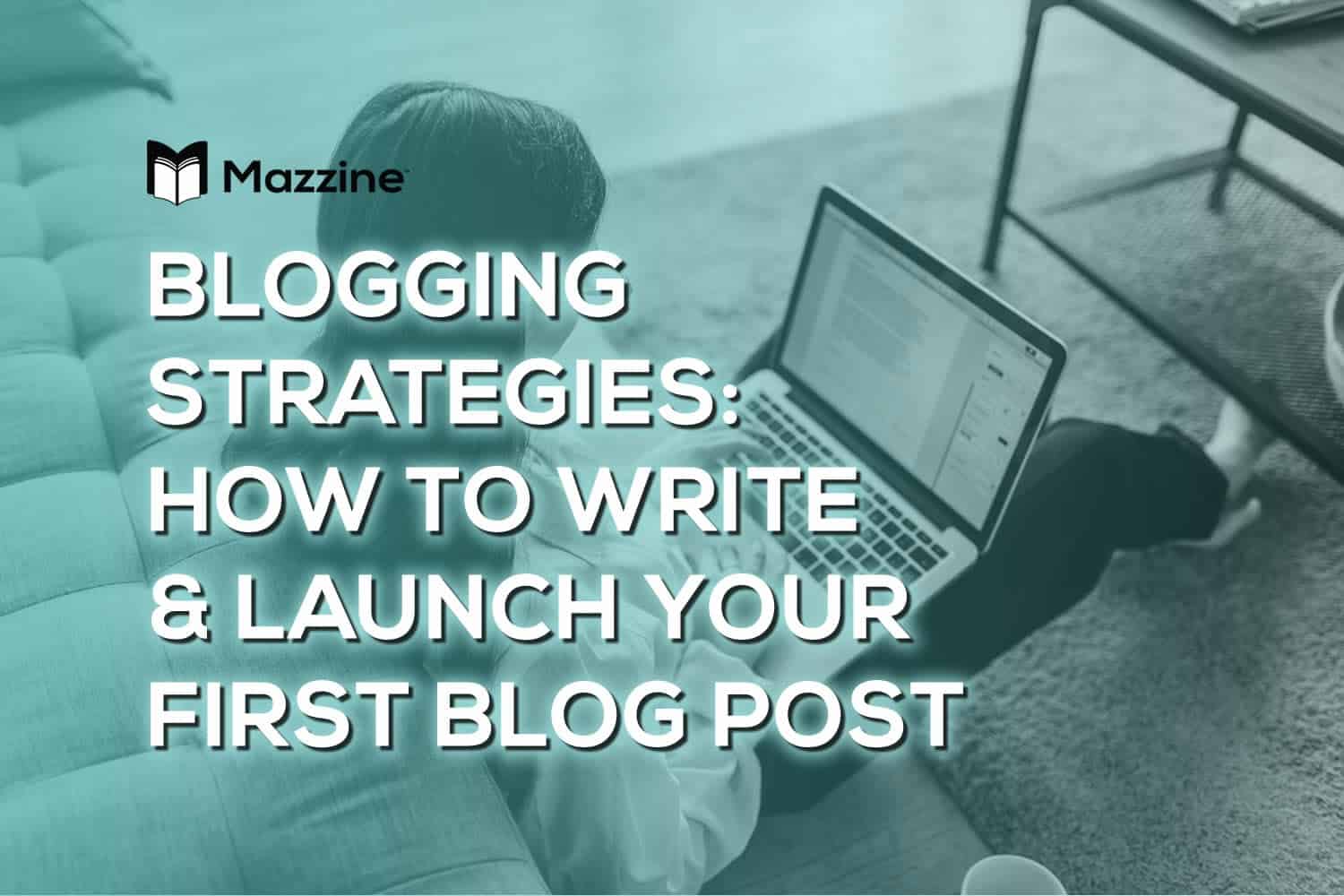Blogging has become an increasingly popular way for businesses and individuals to reach their target audience and promote their products or services. In this article we share some Blogging Strategies: How to Write & Launch Your First Blog Post.
Blogging is a great way to establish yourself as an authority in your field, increase visibility, and improve SEO.
There are many different blogging strategies that you can use to reach your goals, and this article will provide you with an overview of the benefits of blogging and different types of blogging strategies, as well as tips for creating an effective blogging strategy.
Table of Contents
Statistics Show Blogging Strategies Work

Blogging is an effective way to reach a wide audience and build a strong online presence. It can help to increase website traffic, boost search engine rankings, and establish credibility. However, in order to be successful, it is important to have a well-thought-out blogging strategy in place.
Statistics show that businesses that blog regularly see an increase in website traffic, leads, and sales. For example, companies that blog 16 or more times per month receive 3.5 times more traffic than those that blog 0-4 times per month. Additionally, companies that blog 11 or more times per month generate more than twice as many leads as those that blog 0-4 times per month.
In addition to increasing website traffic and leads, blogging can also help to improve search engine rankings. Studies show that companies that blog regularly are more likely to appear on the first page of Google search results. This is because search engines prioritize websites that regularly publish fresh content.
Finally, blogging can help to establish credibility and trust with potential customers. People are more likely to trust a company if they can read about their products and services in a blog post. Additionally, blogging can help to build relationships with customers and establish a strong online presence.
Overall, having a well-thought-out blogging strategy in place is essential for businesses that want to increase website traffic, boost search engine rankings, and establish credibility.
Statistics show that businesses that blog regularly see an increase in website traffic, leads, and sales. Additionally, blogging can help to improve search engine rankings and build relationships with customers.
Definition of Blogging
Blogging is a form of online writing that involves creating content for a website or blog. Blogs share opinions, discuss topics, and provide information about a variety of topics.
Blogging is also good for promoting products or services, as well as to create a community of readers interested in the same topics.
Writing blog posts is a great way to reach a wide audience and establish yourself as an authority in your field.
Overview of Blogging Strategies
There are many different types of blogging strategies bloggers can use to reach their goals.
Content marketing involves creating content that is relevant to your target audience and promoting it through various channels.
Guest blogging involves writing content for other websites or blogs in order to reach a wider audience.
Social media marketing involves using social media platforms to promote your content and engage with your audience.
When implemented correctly each of these strategies can help to reach your blogging goals, and it is important to find the right strategy for your business.
The Benefits of Blogging

Blogging is a great way to express yourself, share your ideas, and connect with others. It can also be a great way to make money. Here are some of the benefits of blogging:
1. Increased Visibility:
Blogging can help you increase your visibility online. When posting content on your blog, its viewed by people all over the world. This can help you reach a larger audience and potentially increase your customer base.
2. Improved SEO
Improved SEO in blogging strategies is a great way to increase website traffic and visibility. SEO stands for Search Engine Optimization, and it is the process of optimizing a website or blog to rank higher in search engine results increasing blog visability.
When it comes to blogging, SEO helps optimize content for search engines. This includes optimizing titles, meta descriptions, and keywords to ensure that content is more visible to search engines.
SEO is also vital for creating backlinks to other websites, which can help to increase the visibility of a blog post.
Another way to improve SEO in blogging strategies is to create content that is engaging and informative. This can include providing helpful tips, advice, and resources that readers can use. Additionally, it is important to create content that is relevant to the topic of the blog post. This will help to ensure that readers are able to find the content they are looking for.
Finally, it is important to use social media to promote blog posts.
By employing strategies, it’s possible to improve SEO in blogging strategies, and ensure that the blog is properly indexed by search engines such as Google.
Opportunities Gained Blogging Strategies
- Improved Writing Skills:
Blogging can help you improve your writing skills. Writing regularly can help you become a better writer and can help you develop your own unique style. 3.
- Networking Opportunities:
Blogging can also help you network with other bloggers and potential customers. You can connect with people who have similar interests and can help you grow your business.
- Increased Traffic:
Blogging can help you increase the amount of traffic to your website. When you post content regularly, it can help you rank higher in search engine results, which can lead to more people visiting your site.
- Generate Income:
Blogging can also be a great way to make money. You can monetize your blog by selling advertising space, offering sponsored posts, or selling products or services.
Overall, blogging can be a great way to express yourself, share your ideas, and connect with others. It can also help you increase your visibility, improve your writing skills, network with others, increase traffic to your website, and generate income.
Types of Blogging Strategies
1. Niche Blogging: Niche blogging is a type of blogging strategy that focuses on a specific topic or industry. Niche bloggers create content that appeals to a specific audience and tailored to their interests. This type of blogging strategy builds a loyal following and establish expertise in a particular area.
2. Guest Blogging: Guest blogging is a strategy that involves writing content for another blog or website. Guest bloggers often write content that is related to the blog or website they are writing for, and they often link back to their own blog or website. Being a Guest blogging is a great way to build relationships with other bloggers and to increase exposure for your own blog.
3. Content Marketing: Content marketing focuses on creating content that is valuable to readers. Marketing with content can include blog posts, videos, infographics, and other forms of content thats created to inform and engage readers. Content marketing is a great way to build relationships with readers and to drive traffic to your blog.
4. Social Media Marketing: Social media marketing is a type of blogging strategy that involves using social media platforms to promote your blog. Social media marketing can include creating content for social media platforms, engaging with followers, and using paid advertising to reach a wider audience.
5. SEO Blogging: SEO blogging is A blogging strategy focusing on optimizing content for search engines. It involves using keywords and other SEO techniques to make content more visible in search engine results. SEO blogging can help to increase traffic to your blog and improve your search engine rankings.
Tips for Effective Blogging Strategies

Researching topics for effective blogging is an important part of the blogging process. It is important to research topics that are relevant to your blog’s audience and that will engage them. When researching topics, it is important to consider the following:
- What are the interests of my audience?
- What topics are trending in my industry?
- What topics are popular in my niche?
- What topics have been successful in the past?
- What topics are my competitors writing about?
- What topics are my readers asking for?
- What topics are my readers passionate about?
- What topics are my readers knowledgeable about?
Once you have answered these questions and have a clear plan for your blogging strategy it’s time to focus on:
Blogging Strategies to Focus on When Blogging
1. Create Quality Content: Quality content is the key to successful blogging. Make sure your content is well-researched, informative, and engaging. Also, make sure to use relevant keywords throughout your posts to help them rank higher in search engine results.
2. Promote Your Content: Once you have created quality content, you need to promote it. Utilize social media platforms, such as Twitter, Facebook, and Instagram, to share your blog posts, you can also start your own email newsletter and attract more readers.
3. Engage with Your Audience: Engaging with your audience is essential for successful blogging. Respond to comments, answer questions, and interact with your readers to build relationships and trust.
4. Utilize SEO: Search engine optimization (SEO) is a great way to increase your blog’s visibility. Utilize keywords, backlinks, and other SEO tactics to help your blog rank higher in search engine results.
5. Track Your Results: Tracking your results is important for understanding what works and what doesn’t. Use analytics tools, such as Google Analytics, to track your blog’s performance and make adjustments as needed.
6. Network with Other Bloggers: Networking with other bloggers is a great way to increase your blog’s visibility and reach. Reach out to other bloggers in your niche and collaborate on projects, guest post, and share each other’s content.
7. Stay Consistent: Consistency is key when it comes to blogging. Make sure to post regularly and stick to a schedule to keep your readers engaged and coming back for more.
Conclusion
In conclusion, Blogging is an effective way to reach a wide audience and build a strong online presence. To maximize the success of a blog, it is important to have a clear strategy in place.
This includes creating content that is relevant to the target audience, optimizing posts for search engines, and using social media to promote the blog.
Additionally, it is important to establish a consistent posting schedule, interact with readers, and measure the success of the blog.
There are many different types of blogging strategies available to reach your goals, including content marketing, guest blogging, and social media marketing
With the right blogging strategies, blogging can be a great way to increase visibility, improve SEO, and create networking opportunities.
FAQ
What is the strategy for blogging?
The strategy for blogging is to create content that is interesting, informative, and engaging to your target audience. This means understanding who your target audience is and what topics they are interested in.
Once you have identified your target audience, you can create content that is tailored to their interests. When creating content, it is important to focus on quality over quantity. You should strive to create content that is well-written, well-researched, and provides value to your readers.
Additionally, it is important to be consistent with your content. Posting regularly will help you build an audience and keep them engaged. Finally, it is important to promote your blog. You can do this through social media, email marketing.
What makes a blog successful?
A successful blog is one that is able to draw in and engage an audience. To do this, the blog must have quality content that is interesting, informative, and relevant to the readers.
The blog should also be regularly updated with fresh content to keep readers coming back.
Additionally, the blog should be well-designed and easy to navigate, with a clear and concise layout that makes it easy to find the information readers are looking for. Finally, a successful blog should also be optimizedfor search engines, so it ranks well and is easily found.
Why do some blogs fail?
Many blogs fail because they lack a clear purpose or focus. Without a clear purpose, the blog can become unfocused and disorganized, making it difficult for readers to find what they are looking for.
Many bloggers fail to update their blog regularly, which can lead to a lack of interest from readers. In addition to lacking a clear purpose and consistent posting schedule,
Other reasons why some blogs fail include poor writing quality and a lack of consistency in posting. Quality writing and a consistent posting schedule is vital.
Another common reason why blogs fail is that the blogger does not promote their blog enough. Without promotion, it is difficult for readers to find the blog.
What to avoid in blogging?
When it comes to blogging, there are certain things that should be avoided in order to ensure that your blog is successful. Here are some of the most important things to avoid when blogging:
- Plagiarism: Plagiarism is a serious offense and can have serious consequences. Always make sure to give credit to the original source of any content you use on your blog.
- Unoriginal Content: Try to avoid using content that has already been used on other blogs. This can be seen as unoriginal and can lead to a lack of trust from your readers.
- Poor Grammar and Spelling: Poor grammar and spelling can make your blog look unprofessional and can be off-putting to readers. Always make sure to proofread your posts before publishing them.
- Too Much Advertising: While advertising can be a great way to make money from your blog, too much of it can be distracting and can turn readers away.


